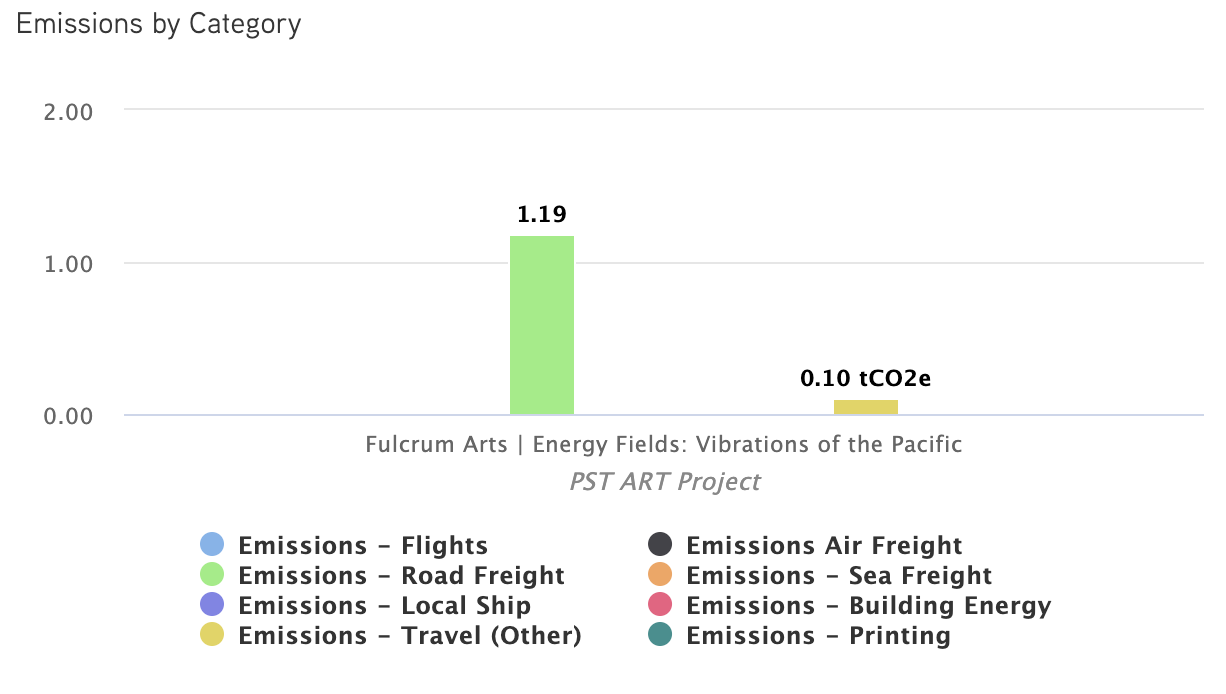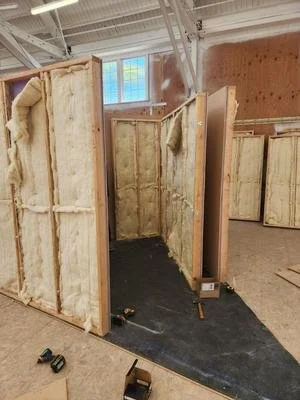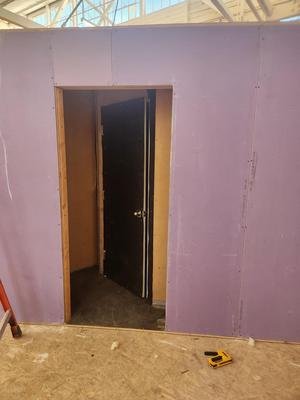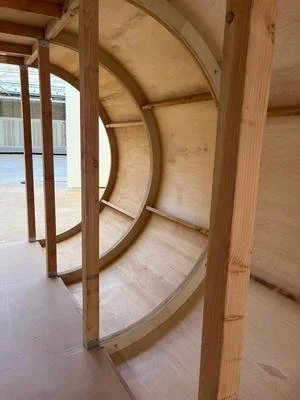Fulcrum Arts | Energy Fields: Vibrations of the Pacific (PST ART)
Climate Impact Report
9/15/2024 01/19/2025 18 WEEKS
4-10 ARTISTS 1-5 ARTWORKS 4000SQFTEnergy Fields: Vibrations of the Pacific participated in the PST ART Climate Impact Program as part of Getty’s landmark art event in Southern California. Primarily utilizing various material choices to lessen climate impact, the fabrication studio Studio Sereno fabricated three major installation pieces for this exhibition. Studio Sereno also opted for construction processes that enhanced the ability to disassemble for reuse and recycling after the show.
Emissions
Emissions related to the fabrication of three pieces fabricated by Studio Sereno.
Travel
0.10 tCO2e
Car, Other
Fabrication required approximately six 90 mile round trips in a personal vehicle. Resulting in about 540 total miles and approximately 20 gallons of used gas. According to the GCC Carbon calculator, this resulted in .1 tCO2e.
Shipping
1.19 tCO2e
Other
Two road freight shipments to fabricate and install the work were required from Los Angeles to Orange, CA. Each trip was approximately 45 miles, and one transported 10,000 lbs and the other transported 8000 lbs of material. According to the GCC Carbon Calculator, this resulted in 1.19 tCO2e. In addition to this, we estimate there were about four 20 miles trips required for local material deliveries, not included in this number. Deliveries were grouped to minimize quantity, resulting in more emission efficiency.
Energy
We do not have access to energy data from the gallery space to report on Building Energy for the exhibition. However, this exhibition incorporated energy saving initiatives.
We were able to calculate the energy use consumed by the fabrication studio for the period it was dedicated to the project.
| PREMISES | COUNTRY / STATE | DATE RANGE | ELECTRICITY (KWh) | GAS (KWh) | Square Footage Coverd by Electricity Use Number | SUPPLIER | tCO2e |
| Studio Sereno | USA/CA | 11/2023 to 8/2024 | 180 | 0 | 1200 | LADWP | 0.04 |
Total Calculated Emissions 1.33 tCO2e
Materials & Waste
Material Categories Included
Artwork/Fabrication, Walls, Wall Paint, Acoustic Panels, Insulation, Reusable Packing, Other
Material Sources
New
Material Destinations
Reused, Sold/Donated, Repurposed, Recycled
Material Use Notes
Waste reduction strategies implemented, Designed for disassembly, Bio-based materials, Other waste/material considerations
Artists Commit Material Stipend
With the support of the PST ART Climate Impact Program led by LHL Consulting we researched minimizing the use of energy-intensive and toxic materials in the construction of “Telepathy.” In particular we sought an alternative to fiberglass insulation.
Eco friendly Sheep’s Wool Insulation supported by the Artists Commit Material Stipend.
Fiberglass insulation manufacturing requires significant amounts of energy, contributing to greenhouse gas emissions. Additionally, some manufacturing plants may release volatile organic compounds (VOCs) into the atmosphere. Working with fiberglass insulation poses possible discomfort to our eyes, lungs and skin. Through Parson's Healthy Materials Lab Materials Collection we found Havelock Wool insulation, a Reno, NV-based company that manufactures 100% sheep’s wool insulation.
The cost of materials for standard fiberglass insulation would have been about $996. The same quantity of sheep’s wool insulation cost $2464. We applied for and received an Artists Commit materials stipend to help make up the difference in cost. Though the initial expense was signicantly higher, the energy saved in the creation of the insulation, our comfort and safety during the installation and deinstallation, the reusability, and lifecycle of this choice provides better value.
We were able to use Havelock’s sheep’s wool insulation to recreate “Telepathy” as designed, and per specification provided by the customer. We have since reused it in subsequent projects. We estimate that this choice saved our team hours of strained, careful construction wearing gear to protect our eyes, lungs, and hands and possible post-construction discomfort of stray glass fibers.
Material Report
98% of all materials have been reused.
Reused Material included lumber, acoustic absorbers, electronics, 100% post-consumer recycled tires rubber for sound insulation, sheep's wool insulation, acoustic drywall.
It was challenging to reduce waste for this show, but in the end it was successful and educational.
Some of the challenges we faced were donating the materials through recycling companies. The costs were prohibitive for us. It was challenging to find someone to commit to taking the donations early on in the process, however through personal connections, nearly all materials will be donated and reused for art and production. This taught us that our networks are often much more resourceful than companies.
Full material use report:
| Qty | Material/Item | Quantity/Size (approx, descriptive) | Category | Source | Destination |
| 19 | 1/2" plywood | 4'x8' | Construction Materials | New | Reused |
| 42 | 3/4" plywood | 4'x8' | Construction Materials | New | Reused |
| 190 | 2x4 fir x8' | 2'x4' | Construction Materials | New | Reused |
| 35 | Drywall 5/8" | 4'x8' | Construction Materials | New | Reused |
| 9 | Acoustic rubber | 4x25' rolls | Mixed Plastics | New | Reused |
| 624' | Insulation- sheeps wool | 24" wide bats | Other | New | Reused |
| 27 | 1/4" luan | 4'x8' | Construction Materials | New | Recycled |
| 14 | 4x4 fir x8' | 4'x4' | Construction Materials | New | Reused |
| 44 | 1x3 pine x8' | 1'x3' | Construction Materials | New | Recycled |
| Misc | Hardware | H'Hardware' | Metals | New | Storage |
Engagement
Stakeholders engaged in the Climate Impact Report:
Exhibitions / Install, Fabricators, Environmental Justice / Climate Justice Groups
Our Team
Studio Sereno, the fabrication partner, aggressively and successfully managed the climate action protocols. No overtime hours were utilized for the project.
Our Community
Studio Sereno participated in the PST ART Climate Impact program by attending office hours, educational webinars, and the PST ART Climate Impact Report Show and Tell hosted at Hauser & Wirth gallery in October 2024. Through this program we were able to connect with other organizations. We also reached out to our network to find destinations for material used in the fabrication and were able to donate all material to others in our community.
Reflections & Takeaways
Participating in the PST ART Climate Impact Program and completing this Climate Impact Report was enriching, educational, inspirational and door opening.
Credits
Jeff Kleeman and Natalie Ferguson completed this report. It was an interesting process for us because it broke down all the components of the construction, travel, installation and repurposing of materials in a way that was new to both of us. It gave us valuable ideas to carry through in our own personal art practices and professional projects.
Jessica Gath from Artists Commit and Laura Lupton from LHL Consulting supported adopting this report for Artists Commit.
Materials attached using only screws
This Climate Impact Report was completed as a part of the PST ART Climate Impact Program, a groundbreaking initiative integrating climate action, community building, and reporting into Getty’s landmark arts event, led by LHL Consulting. More information can be found at pst.art/climate.






